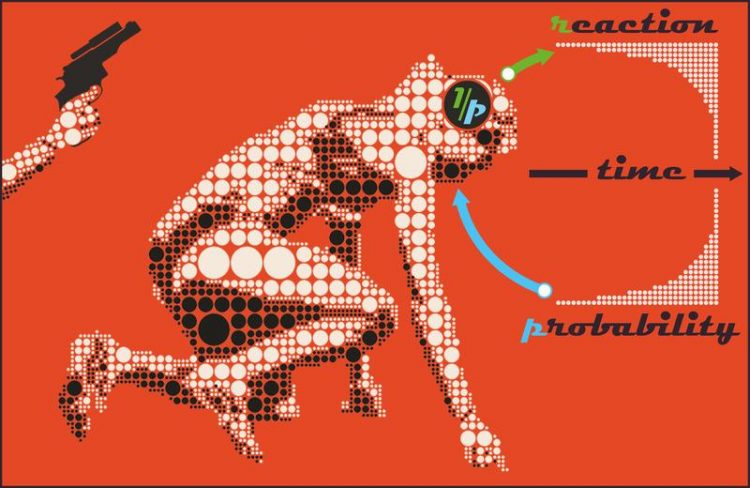The Anticipation of Events in Time

The reaction time to a stochastic event is proportional to the reciprocal of its probability Figure by Georgios Michalareas
How does the brain learn when an event is more probable to happen?
It has been a long-standing question how the brain represents probabilities across time. The main candidate mechanism to date has been the computation of Hazard Rate, i.e., the probability that an event is about to happen given that it has not happened already.
In their article in Nature Communications, Matthias Grabenhorst, Georgios Michalareas and other reasearchers demonstrate with behavioral experiments that the brain uses a much simpler computation instead—it just estimates the reciprocal of probability.
This is a fundamental finding, shedding light onto a canonical principle of how the brain models probabilities. The close relationship between the reciprocal probability and Shanon information content (also termed Surprisal) hints that the brain actually represents probabilities in terms of information.
“Probability itself is the fundamental parameter used by the brain”, says lead author Matthias Grabenhorst.
A second important finding in this work concerns the uncertainty in estimation of elapsed time. Previous research has demonstrated that the longer the elapsed time, the higher the uncertainty in its estimation by the brain.
Grabenhorst and his colleauges present evidence that this principle of monotonically increasing uncertainty with elapsed time does not always hold.
It is actually the probability distribution of events across time which determines when uncertainty is lowest or highest.
Finally, the authors show that the above findings hold in three different modalities: vision, audition, and somatosensation.
This commonality hints to either a central mechanism used by all three modalities or by a canonical peripheral mechanism employed in multiple sensory areas of the brain.
Dr. med. Matthias Grabenhorst
+49 69 8300479-340
matthias.grabenhorst@ae.mpg.de
Grabenhorst, M., Michalareas, G., Maloney, L. T., & Poeppel, D. (2019). The anticipation of events in time. Nature Communications, 10(1). doi:10.1038/s41467-019-13849-0
Media Contact
More Information:
http://www.ae.mpg.de/All latest news from the category: Health and Medicine
This subject area encompasses research and studies in the field of human medicine.
Among the wide-ranging list of topics covered here are anesthesiology, anatomy, surgery, human genetics, hygiene and environmental medicine, internal medicine, neurology, pharmacology, physiology, urology and dental medicine.
Newest articles

Why getting in touch with our ‘gerbil brain’ could help machines listen better
Macquarie University researchers have debunked a 75-year-old theory about how humans determine where sounds are coming from, and it could unlock the secret to creating a next generation of more…

Attosecond core-level spectroscopy reveals real-time molecular dynamics
Chemical reactions are complex mechanisms. Many different dynamical processes are involved, affecting both the electrons and the nucleus of the present atoms. Very often the strongly coupled electron and nuclear…

Free-forming organelles help plants adapt to climate change
Scientists uncover how plants “see” shades of light, temperature. Plants’ ability to sense light and temperature, and their ability to adapt to climate change, hinges on free-forming structures in their…





















